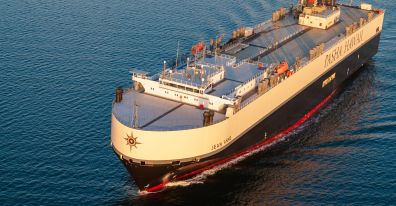Port of San Diego and The Pasha Group Achieve Major Clean Air Milestone

MV Jean Anne Becomes First Ro-Ro Vessel and Pure Car Carrier Commissioned for Shore Power in the U.S.
The Port added the single shore power plug at the National City Marine Terminal at a cost of $6.6 million, which includes $2.5 million in grant funding from the Volkswagen Environmental Mitigation Trust for California, administered by the California Air Resources Board.
All four of the Port’s marine terminals – two cargo facilities at the National City and Tenth Avenue Marine Terminals, and two cruise terminals at B Street and Broadway Piers – now have shore power available. In 2010, the Port of San Diego was among the first ports in the country to install shore power for ocean-going vessels.
Shore power systems support the Port’s Maritime Clean Air Strategy, which aims to improve environmental and public health through cleaner air while also supporting efficient, modern and sustainable maritime operations. Specifically, it supports the goal to reduce emissions from ocean-going vessels. It also advances the Port’s commitment to the California Air Resources Board’s (CARB) At-Berth Regulation that requires ro-ro vessels to utilize shore power or an exhaust capture control system, also known as a bonnet, which is a barge-based system that captures and filters air pollutants from the vessel’s stack while a ship is at berth. The National City Marine Terminal now has both a shore power and a bonnet system.
Pasha Automotive Services, the National City Marine Terminal operator, is a division of The Pasha Group, a family-owned company that has been operating at the Port of San Diego for 35 years. Pasha Automotive Services runs the most advanced vehicle import/export facility on the West Coast, importing and processing approximately 400,000 vehicles each year from Europe, Asia, and Mexico. Pasha Hawaii, a sister company, transports goods, equipment, and supplies on U.S.-flagged ro-ro and container ships between the U.S. and Hawaii.
The Port of San Diego is on the leading edge of adopting clean zero-emission technologies and equipment for maritime operations. Other “Port of Firsts” include:
First port in North America to have all-electric mobile harbor cranes.
First port in the country with an all-electric tugboat, which is operated by Crowley Marine.
Among the first ports to deploy a renewable powered microgrid system providing clean reliable power to the Tenth Avenue Marine Terminal.
First port on the West Coast with a tenant, Dole, to deploy battery-electric utility tractor rigs (UTRs) for cargo handling.
Since 2021, the Port and partners have committed more than $227 million toward maritime electrification and zero emissions initiatives resulting in decreased emissions since 2019. According to the Port’s 2024 Maritime Air Emissions Inventory, there has been a significant decrease in emissions compared to the 2019 Maritime Air Emissions Inventory:
46% reduction in diesel particulate matter (DPM) emissions.
32% reduction in nitrogen oxides (NOx) emissions.
10% reduction in greenhouse gases (CO2e).
